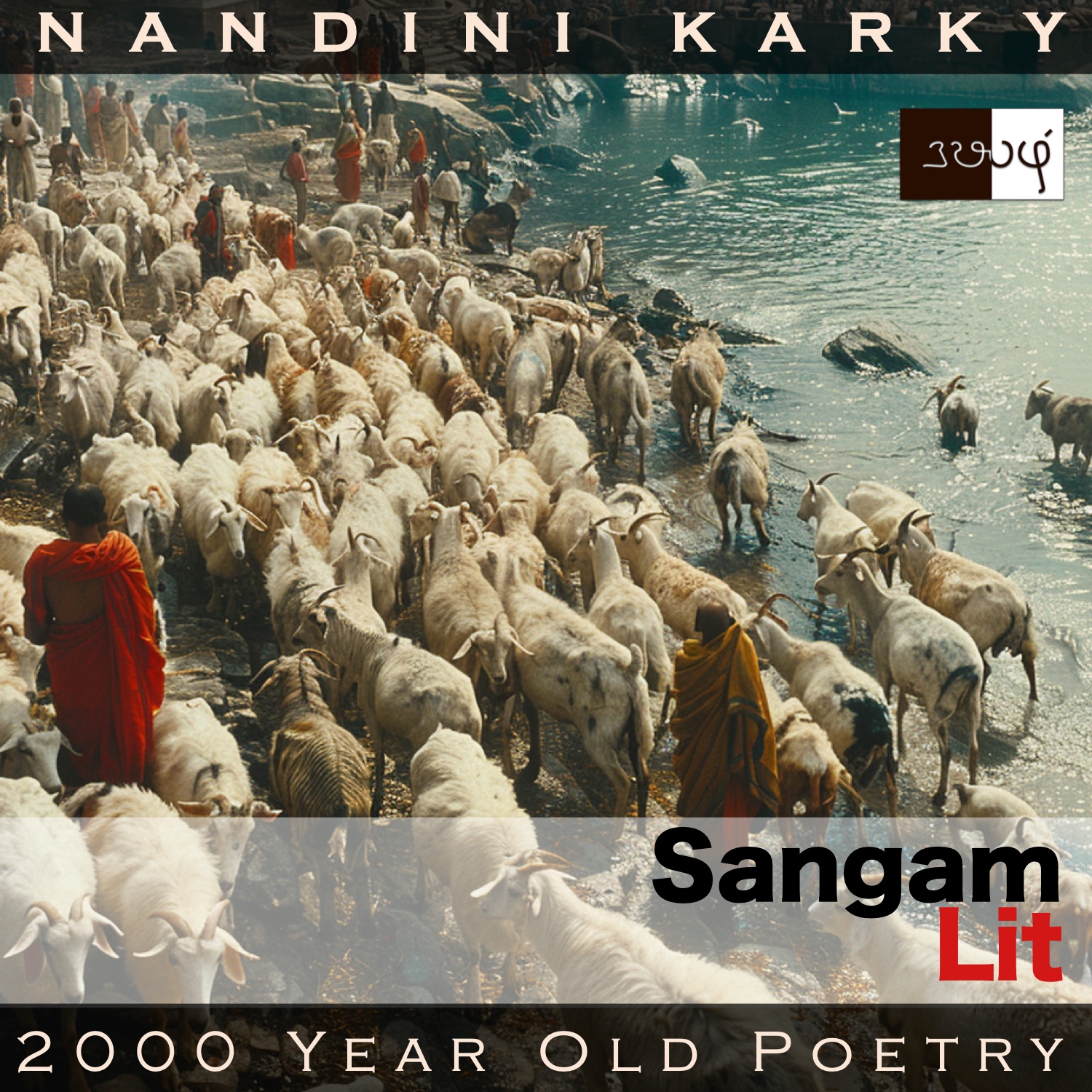Podcast: Play in new window | Download
Subscribe: Apple Podcasts | Spotify | Amazon Music | Android | iHeartRadio | Email | TuneIn | RSS | More
In this episode, we perceive the certainty of death, as depicted in Sangam Literary work, Puranaanooru 366, penned by the poet Kothamanaar. The verse is situated in the category of ‘Kaanji Thinai’ or ‘Defence’ and instructs a leader about the way to be.

விழுக் கடிப்பு அறைந்த முழுக் குரல் முரசம்
ஒழுக்குடை மருங்கின் ஒரு மொழித்து ஆக,
அரவு எறி உருமின் உரறுபு சிலைப்ப,
ஒரு தாம் ஆகிய பெருமையோரும்,
தம் புகழ் நிறீஇச் சென்று மாய்ந்தனரே;
அதனால், அறவோன் மகனே! மறவோர் செம்மால்!
நின்னொன்று உரைப்பக் கேண்மதி:
நின் ஊற்றம் பிறர் அறியாது,
பிறர் கூறிய மொழி தெரியா,
ஞாயிற்று எல்லை ஆள்வினைக்கு உதவி,
இரவின் எல்லை வருவது நாடி,
உரைத்திசின் பெரும! நன்றும்
உழவு ஒழி பெரும் பகடு அழி தின்றாங்கு,
செங் கண் மகளிரொடு சிறு துனி அளைஇ,
அம் கள் தேறல் ஆய் கலத்து உகுப்ப,
கெடல் அருந் திருவ!
மடை வேண்டுநர்க்கு இடை அருகாது,
அவிழ் வேண்டுநர்க்கு இடை அருளி,
விடை வீழ்த்துச் சூடு கிழிப்ப,
நீர் நிலை பெருத்த வார் மணல் அடை கரை,
காவுதொறும் இழைத்த வெறி அயர் களத்தின்
இடங்கெடத் தொகுத்த விடையின்
மடங்கல் உண்மை, மாயமோ அன்றே.
Yet again, a royal person is presented with the facts of life. The poet’s words can be translated as follows:
“As a deep-throated drum is struck by a huge stick, as it moves amidst the disciplined rows and echoes in a single voice, akin to how thunder that destroys snakes resounds, there have been men with great pride and fame who ruled the world singlehandedly. After instilling their fame, they have gone and perished!
And so, the son of the just! O brave warrior! I will say one thing to you. Please listen: Not letting others see your strength, and understanding the meaning behind the words said by others, helping others in their tasks of the day, waiting for what the night brings, speak words of wisdom, O lord!
Akin to how a huge bull which ploughs hard during the day feeds in the eve, with red-eyed maiden, delight a little and drink the well-chosen toddy brought by them, O leader with plenty! To those who desire meat, fell goats and ceaselessly give the roasted meat and to those who desire food, offer rice.
On the sands near the waterbodies, in the orchards, where fields have been set aside for ‘Veri rituals’, akin to how the goats brought there are bound to die, this is certain. There can be no illusion here!”
Let’s delve into the details. The poet starts as is the usual case in such poems by talking about other great and famous kings, who lived before, who ruled over a great expanse under their single rule and made their drum resound all over the land akin to how thunder resounds in the skies. These kings are dead and gone, the poet informs the listening leader. And then goes on to instruct him to hide his strength from others and to perceive the inner meanings of people’s words and speak words of wisdom, helping the workers of the day. Then, the poet turns from justice to the other two tenets of this philosophy, which is pleasure, by eating and delighting in the company of maiden, and finally, generosity, towards which the poet instructs the king to give ceaselessly meat and rice to those who come seeking. All this is to be done, because just as how death will surely come for the rows of goats assembled for the ‘Veri’ rituals on sandy shores of rivers by priests, the same death comes for all people without fail, the poet concludes.
The interesting element in this rendition of death’s strike is the comparison of human lives to those of the goats slaughtered for those religious rituals. It must have been a humbling thought for these kings to see that no matter their wealth, their fame and their conquests, they are no different from the goats waiting to be killed. Maybe it’s this dose of reality from the words of poets that kept these ancient Tamil kings in a grounded and less authoritarian attitude, something markedly different from the ‘I’m god’ motto of royal personalities in many other parts of the world, as history informs us!




Share your thoughts...